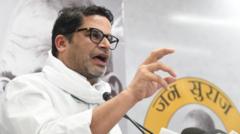Why Do Political Start-Ups in India Struggle to Succeed?

Published: 2025-11-15 04:00:29 | Category: world
Prashant Kishor, a celebrated political strategist in India, faced a disappointing outcome with his party Jan Suraaj in the recent Bihar elections, failing to secure any seats despite significant media attention and a well-organised campaign. This situation highlights the challenges new political parties face in gaining traction in a deeply entrenched political landscape, where visibility alone does not guarantee electoral success.
Last updated: 15 October 2023 (BST)
What’s happening now
The recent Bihar elections, held in October 2023, have seen Kishor's Jan Suraaj fail to make a significant impact, as the ruling coalition led by Nitish Kumar's Janata Dal (United) and the Bharatiya Janata Party (BJP) secured a sweeping victory. Despite Kishor's innovative campaigning methods and the promise of good governance, voters remained loyal to established parties, revealing the difficulty new entrants face in Indian politics.
Key takeaways
- Jan Suraaj failed to win any seats in Bihar, despite a well-funded and organised campaign.
- Voter loyalty to established parties proved stronger than media hype.
- New political parties face significant challenges in gaining traction without grassroots support.
Timeline: how we got here
Understanding the trajectory of Kishor's political journey offers insight into the current situation:
- 1983: The Telugu Desam Party (TDP) rises, marking a shift in Indian regional politics.
- 2011: Prashant Kishor begins his career as a political strategist, gaining prominence.
- 2021: Kishor announces plans to launch Jan Suraaj in Bihar, aiming to disrupt traditional politics.
- 2023: Bihar elections occur; Jan Suraaj fails to secure any seats.
What’s new vs what’s known
New today/this week
The results of the Bihar elections have solidified the dominance of the existing political landscape, with Kishor's Jan Suraaj failing to make any impact despite the extensive groundwork laid over the past two years.
What was already established
Historically, new political parties in India have struggled to establish themselves without strong grassroots support or existing social bases. Previous examples include the rise and fall of several parties that emerged from socio-political movements rather than intellectual initiatives.
Impact for the UK
Consumers and households
While Bihar's political scenario may not directly impact UK households, the overarching themes of political engagement and voter behaviour present interesting parallels for UK voters, especially in light of upcoming elections.
Businesses and jobs
For businesses, the stability provided by established political parties can foster a conducive environment for investment and growth. Conversely, the emergence of new parties can introduce uncertainty, affecting market conditions.
Policy and regulation
In the UK context, the dynamics of party competition and voter loyalty can inform discussions around policy-making, especially as new political movements seek to gain traction amidst established governance frameworks.
Numbers that matter
- 243: The total number of seats contested by Jan Suraaj in Bihar.
- 0: Seats won by Jan Suraaj in the recent elections.
- 130 million: The estimated population of Bihar, largely young and politically aware.
Definitions and jargon buster
- Jan Suraaj: A political party launched by Prashant Kishor focused on governance and development in Bihar.
- BJP: Bharatiya Janata Party, the ruling political party in India led by Prime Minister Narendra Modi.
- padayatra: A long, grassroots walk undertaken by political leaders to connect with the electorate.
How to think about the next steps
Near term (0–4 weeks)
In the immediate aftermath of the elections, Kishor will likely focus on reassessing his strategy and strengthening grassroots engagement in Bihar.
Medium term (1–6 months)
Over the next few months, Jan Suraaj may work on cultivating local leadership and establishing a more robust organisational framework to connect with voters.
Signals to watch
- Reports of grassroots activities and community engagement initiatives by Jan Suraaj.
- Public response to Kishor's continued presence in Bihar and his proposed actions.
- Any shifts in voter sentiment towards new political alternatives in Bihar.
Practical guidance
Do
- Continue engaging with local communities to build trust and understanding.
- Focus on relatable leadership that can connect with the electorate.
- Develop a clear and appealing agenda that resonates with voters.
Don’t
- Neglect the importance of grassroots movements and local issues.
- Rely solely on media visibility without a strong organisational base.
- Assume that a well-funded campaign guarantees electoral success.
Checklist
- Assess community needs and expectations regularly.
- Foster local leadership and participatory decision-making.
- Maintain a consistent presence in the region beyond election cycles.
Risks, caveats, and uncertainties
The failure of Jan Suraaj to gain electoral foothold raises questions about the viability of new political ventures in India. While Kishor's strategy may have been sound on paper, the lack of a strong grassroots movement and established social bases significantly undermined his efforts. Future attempts to build political influence will require navigating these complexities while adapting to the evolving political landscape.
Bottom line
The disappointing performance of Jan Suraaj in Bihar illustrates the profound difficulties new political entities face in establishing themselves within a crowded and entrenched political marketplace. Without a strong grassroots foundation, visibility and media attention may not translate into votes. Kishor's future actions will be crucial in determining whether he can convert his initial visibility into a sustainable political force.
FAQs
What does Jan Suraaj stand for?
Jan Suraaj, meaning 'People's Good Governance,' is a political initiative launched by Prashant Kishor aimed at promoting governance and development in Bihar.
Why did Jan Suraaj fail in the Bihar elections?
Despite a strong campaign and media presence, Jan Suraaj failed to connect with voters due to a lack of grassroots support and established social bases.
What can Kishor do next for Jan Suraaj?
Kishor can focus on strengthening grassroots connections, nurturing local leadership, and maintaining engagement with voters to build a sustainable political presence.



